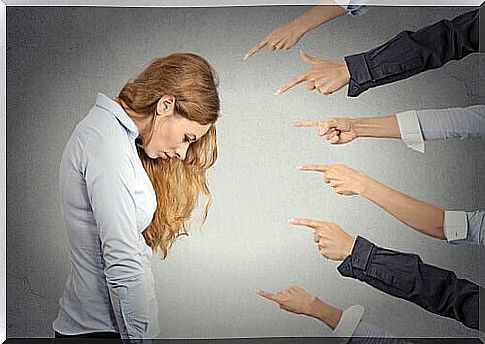Judging: A Common Habit In Frustrated People

People, regardless of their beliefs, their social position or family of origin, yearn for justice to be done in society.
Talking about justice involves countless questions, but in this article we will focus on a point of view that has nothing to do with the law, but with the psychological side of judging and being judged in everyday life.
“It is much more difficult to judge oneself than others” (Antoine de Saint Exupéry)
It can be said that some people do not judge situations in an isolated and targeted way, but that they have assumed the role of judges in the small events of the existence of others, without anyone having asked them to.
It is clear that this is a mistake, because not even a true judge should allow himself to exercise this role outside of his job.
Why is society so full of fake judges? Why do these people consider their views universally valid for themselves and for others? How did they get to this point?
“I hate judgments that crush and do not transform” (Elias Canetti)
Now we are going to introduce you to some interesting characteristics that these robe-free judges share, whose judgments are incredibly harmful and toxic.

People who judge others
People who judge others usually:
- They hate most of their life and, for this reason, they try in every way to poison that of others.
- They are not satisfied with what they are doing and they can’t stand that someone else is happy with their life.
- They are not easily identifiable, as they are not cold people, nor with negative feelings. However, they are extremely frustrated, which leads them to be aggressive, which they manifest in a variety of ways.
- They are tormented by the decisions they make, perhaps imposed from the outside without their really wanting that option. They maintain a relationship of psychic conflict with this type of event in their life.
- They want to justify their life trajectory by discrediting others. Often they exclaim phrases such as “Basically I’m not so bad: look at Tizio for example”.
- They talk about people and not about ideas.
- When they express their opinion about others, they do not do it to reflect on the mistakes and winning moves made by the person in question. They judge based on prejudices that make them reductive, simpleton and impartial.
- Their values are not aimed at instilling calmness in themselves and their environment , but at judging others constantly.
- They have few hobbies and activities that interest them.
- They are not self-critical in what they do. They dislike feeling judged in the challenging tasks they have to complete.
- They get easily irritated.

- The victories of others are considered unjustified, the result of chance and external factors; theirs, on the other hand, consider them justified and deserved.
- They are convinced that by judging others, they will not judge them.
- They do not express opinions in the presence of many people, as this can put them too much in evidence.
- Most of the time, their criticisms reflect their desire to experience what life has denied them or failed to achieve.
- They don’t care about improving. They believe the best way to stand out is by putting others in a bad light.
- Their judgments can be delicate and private, as well as public and dangerous.
You must ignore these people and you must never give them the power to damage your personal or professional reputation, particularly in front of a large number of friends, family or whoever for them.
Indifference is the only weapon against these people, but you must always be on the alert so that they do not cross the line of your intimacy in a deplorable way.
“There are candles that light up everything except the candlestick itself”.
(Friedrich Hebbel)









